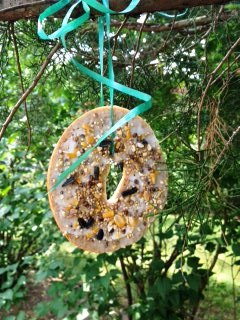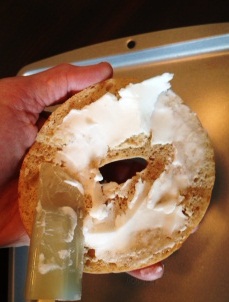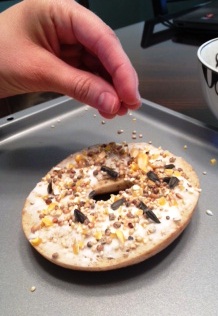Sign Up For Our E-Blast To Receive Information on our Books, Speech Therapy materials and our latest freebies!
Preschool Bird Feeder Activity for Language Development
Preschool Bird Feeder Activity for Language Development
Looking for a great hands-on activity to develop your child’s vocabulary? Then, you’re in luck! Every spring, I make bird feeders with my preschool aged clients. They LOVE it and I LOVE it too! Making bird feeders gives ample opportunities to talk about birds, nature, and even squirrels (gee, I wonder why?). What’s even nicer is that the bird feeders continue to give talking points even after it’s brought home (i.e. “Honey, look there’s a bird eating your bird feeder!”).
Target Age: Preschool Children
As I’ve mentioned in my previous post, I love doing arts and crafts with my young clients.
My goal for this activity is to introduce new vocabulary.
Gather the following materials:
Materials:
- Baking tray
- Stale bagel
- Bird Seed
- Dried cranberries, raisins or other dried fruit
- Vegetable shortening
- Baking Tray
- String, rope, ribbon
- Gloves optional to protect a child from any food allergies, etc
FYI- Remember to be wary of nut and seed allergies. When in doubt ask!
Some possible target words:
Nouns Verbs Adjectives
Seeds Sprinkle Hard
Bagel Scatter Sticky
Bird Feeder Hang Stale
Beak Display Round
Feathers Press Pointy (beak)
Hole Spread Firm
Squirrel Pat Greasy
Procedure:
- Present the bagel and talk about what it looks, feels, and smells like. Since we’re working with a stale bagel, it is most likely hard so emphasize that it’s hard and will be difficult for little boys and girls to bite into. Ask: “What else is hard? (e.g. a table, a rock).” The bagel is also round like a ball. Can you think of anything else? (e.g. wheel of a bike, tire of a car).
- Next, introduce the vegetable shortening to the child. Explain how vegetable shortening is sticky. It sticks to your fingers. Peanut butter, honey and glue are also sticky. Use a dull plastic knife, spatula, or the back of a spoon to spread vegetable shortening onto the bagel. Say: “I’m spreading the shortening (or peanut butter, whatever you choose to use) onto the bagel.” If you feel your child can try it, have him spread some shortening on too (“Benny, do you want to spread some on too?”. NOTICE – I’m trying very hard to introduce vocabulary words to replace the word “PUT”!
The word PUT is so overused with preschoolers.
Preschoolers are very capable of saying more descriptive words like sprinkle, scatter, and spread. They just need exposure to such words Remember, according to studies, conversations between parents and children are the most influential contributors to vocabulary before school entry.
- Then, show the child the bird seed and or dried fruit. Talk about the different colors, shapes and sizes. Show the child how to sprinkle or scatter the seeds onto the bagel. Say, “When you sprinkle something on, you’re putting a little bit here and a little bit there.” Explain to the child how sprinkling is different than dumping something on. If you wanted to, you could even demonstrate the difference. It’s all up to you! Ask the child to carefully sprinkle or scatter the seeds onto the bagel.
- After some seeds have been sprinkled on, then press or pat the seeds into the shortening so they don’t fall off.
- When the bagel is fully covered with seeds, you can tie a ribbon, rope, or string through the hole of the bagel (or it’s middle).
- Lastly, pick a perfect place to hang the bird feeder so that your child can watch the birds chow down!
Interactive storybook activities also help to develop vocabulary. For this reason, I like to read books about birds or bird houses for extension activities. As I’ve mentioned before, many children learn words incidentally. However, to retain a newly learned word, they may have to be exposed to it several times. This is why I like reading books related to birds or bird houses.
Here are some of my favorites:
**Note: I tend to omit the word “darn” when I read it out loud.
Other Tips:
- Birds are attracted to colors! So add some color to your bird feeder. BUT, stay away from white because it signals danger to a bird.
- Position the bird feeder in a quiet but visible area. Preferably away from a fence where squirrels can easily get to it!
Summary of Strategies:
- Provide multiple repetitions
- Narrate your actions and your child’s actions.
- Expose the new word in various settings and contexts (see extension activities for examples)
- Ask interesting, genuine questions to get your child thinking! Do not ask “test-like questions”. Two words: NOT FUN!
Extension Activities:
- Read some books about birds and bird feeders!
- Visit the National Bird-Feeding Society for more bird feeding tips!
- Check out The Crafty Crow and Pretty Prudent for other bird feeder ideas!
- Go on a nature walk!
- Make or buy a birdhouse!
Does your child have a favorite book about birds or bird feeders? If so, please share!
Kimberly Scanlon, M.A. CCC-SLP is a speech language pathologist, an author and a mother. As the owner of Scanlon Speech Therapy, LLC, a unique boutique practice in Bergen County, Kimberly embraces individuality and treats the whole person. Her goal is to spread compassion, hope, and some speech, language and literacy tips one moment, one person at a time. She blogs at www.scanlonspeech.com and www.mytoddlertalks.com. Her first book, My Toddler Talks: Strategies and Activities to Promote Your Child’s Language Development; it’s available for purchase at www.amazon.com.







